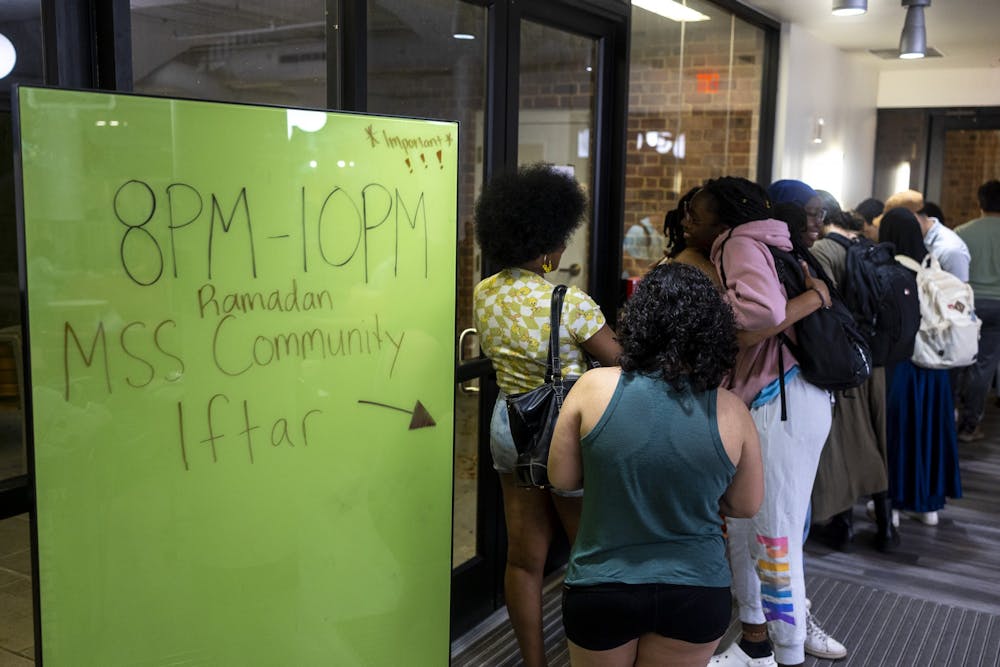Ramadan, the ninth month of the lunar calendar, is a time of fasting, prayer and reflection for the Muslim community. At the University, practicing Muslim students have carved out their own space to celebrate the holiday and forge a community that supports one another.
Ramadan includes fasting from eating until sunset, but also challenges people to refrain from cursing, listening to music and other typical recreational activities during the month the holiday spans. Jessiah Lucien, Muslim United event coordinator and fourth-year Commerce student, described how Ramadan helps him recenter his values and challenge himself to be a more virtuous person.
“Ramadan is always like this amazing thing for me, even though it's a struggle — sometimes it's a beautiful struggle that I always look forward to,” Lucien said.
Fourth-year College student Akaela Feng said that Ramadan encourages her to take a break from everyday stimuli — it’s not just for fasting of the stomach, but fasting of the eyes, ears and throat as well, in order to gain a deeper sense of spirituality.
“It's a month of spiritual cleansing,” Feng said. “Fasting, it's not really a physical thing. Fasting is meant to curb your desires, not just from food, but from things like cursing, lying and talking behind people's backs … Fasting from food is a physical reminder to abstain from these other things as well.”
The University does offer some accommodations for students practicing Ramadan, including free meals offered by U.Va. Dine available for suhoor and iftar. This is in addition to community iftars made possible by CIOs such as the Muslim Student Association and Muslims United as well as the Multicultural Student Center based in Newcomb Hall.
Fourth-year College student Keltoum Laghjibi said she appreciates how the University has grown to provide more accommodations since her first year. Laghjibi described how the creation of the Interfaith Student Center and regularly scheduled iftars around Grounds have been conducive to her observance of Islam and Ramadan.
“Since I'm a fourth-year, I've seen how, my first year, we had a really small prayer space and over time, it has expanded to the Interfaith Center that we have now, and I frequent that space very often,” Laghjibi said.
For a recent convert like Feng, she said that the community-run iftars offer her an opportunity to engage with other Muslims and feel more connected to the community. While some Muslim students have grown up practicing the faith and are more experienced in celebrating Ramadan, converts such as Feng have the opportunity to learn and grow through programming held at the University.
“For me, it's an opportunity to meet a lot of new Muslims,” Feng said. “I haven't had a ton of experience with iftars. So it's really nice to kind of experience that in different forms.”
While some students are satisfied with the kinds of food accommodations available, they also expressed how it is important for them to be acknowledged more at the University. As students need to break their fast and set aside time to pray, Laghjibi said she would like for professors to be more cognizant of practicing students’ needs.
“Sometimes it's difficult, because some students feel like it's a burden to constantly ask their professors for exemptions from quizzes that might be happening during iftar time,” Laghjibi said. “Or they feel like they're gonna miss something relevant in class.”
Laghjibi says she wishes professors would instead take more initiative to help students stay on top of their coursework while still observing Ramadan — even an email, she said, would go a long way.
“Just making sure that professors know that some students are observing Ramadan and to be more mindful of the change in their schedules and maybe sending out an email to students saying ‘if you are fasting during Ramadan, you don't have to worry about certain things and things will be available to you’ that you'd otherwise be kind of hungry, in class,” Laghjibi said.
In a similar vein, Feng said she would like to see the University community acknowledge them as much as they acknowledge other religious holidays. In her experience, she says she has not experienced much visibility.
“Professors will always say ‘Merry Christmas’ to students, but Ramadan is not acknowledged — pretty much at all,” Feng said. “There's obviously a few professors that will say that … and Eid, which is the holiday at the end of Ramadan — I have not had that acknowledged either.”
Lucien pointed out, though, that these drawbacks are not necessarily out of a place of discrimination or malice, but simply a lack of overall visibility for the Muslim community on Grounds, which is something that can be addressed through more conversation.
“I think [it’s] the lack of support, sometimes it's just the fact that people don't know,” Lucien said.
Through Muslims United, Lucien and the club have made efforts to cultivate a more inclusive and visible community on Grounds and help Muslim students feel more connected to their faith. Through community events, Muslims United aims to bring students together during the month of Ramadan and beyond.
Overall, Laghjibi said she feels the University has made strides in promoting a more inclusive and welcoming environment on Grounds for Muslim students. With community iftars and support from Muslims United, Laghjibi said she feels supported in her faith.
“I have always felt welcome,” Laghjibi said. “More so from my own community, and I know that we get a lot of support from U.Va., and I appreciate that.”







